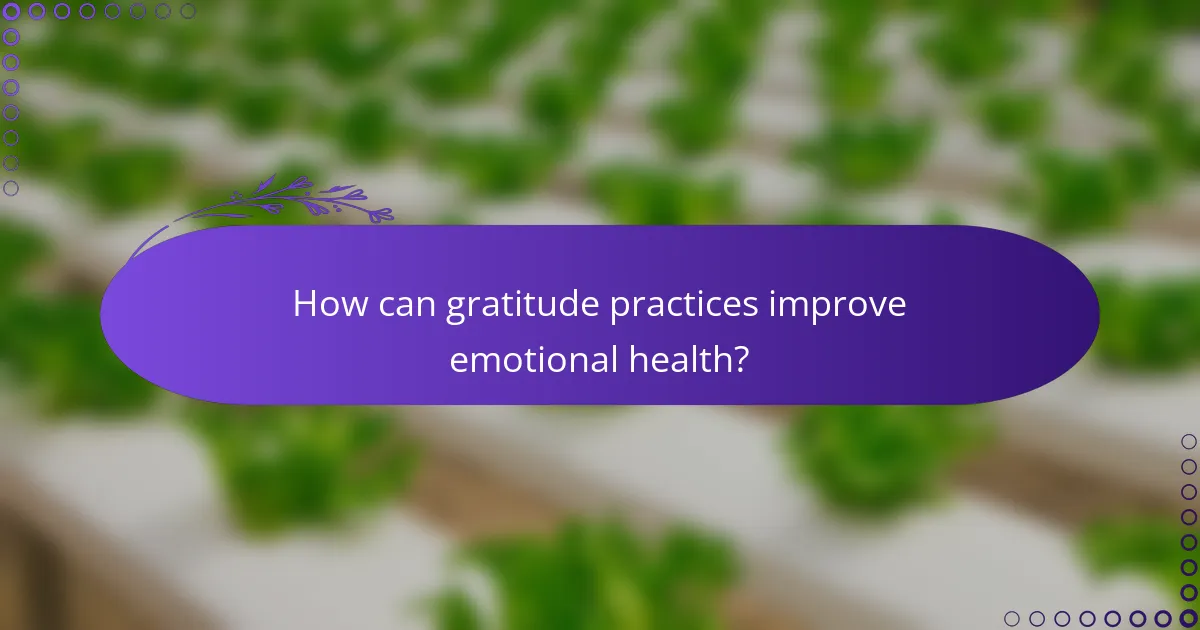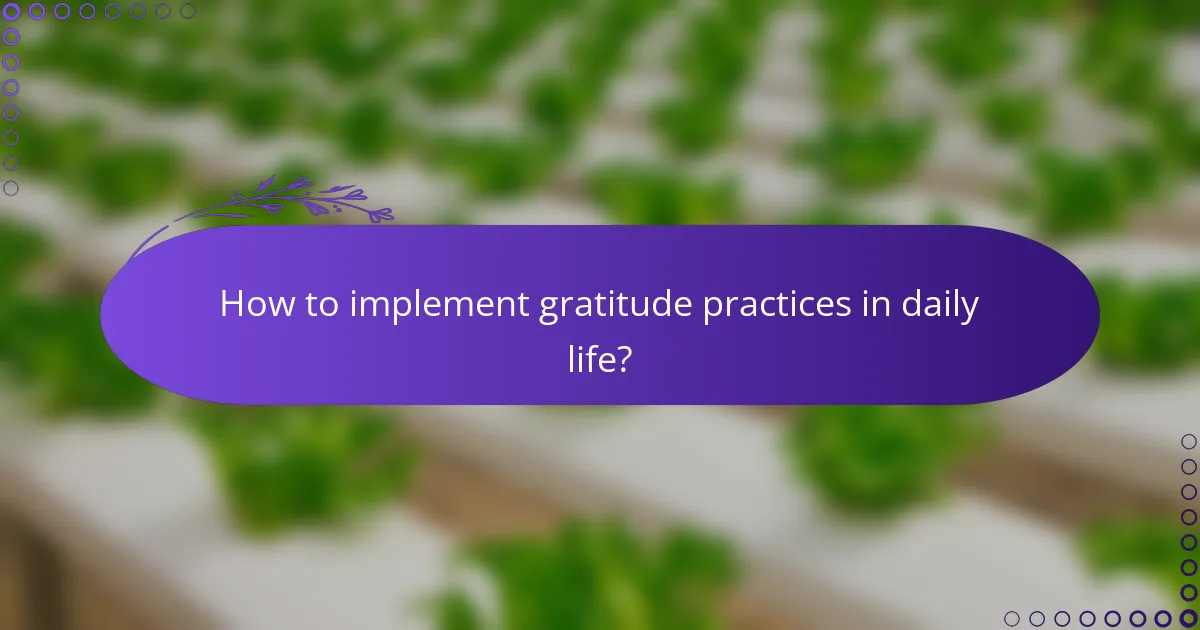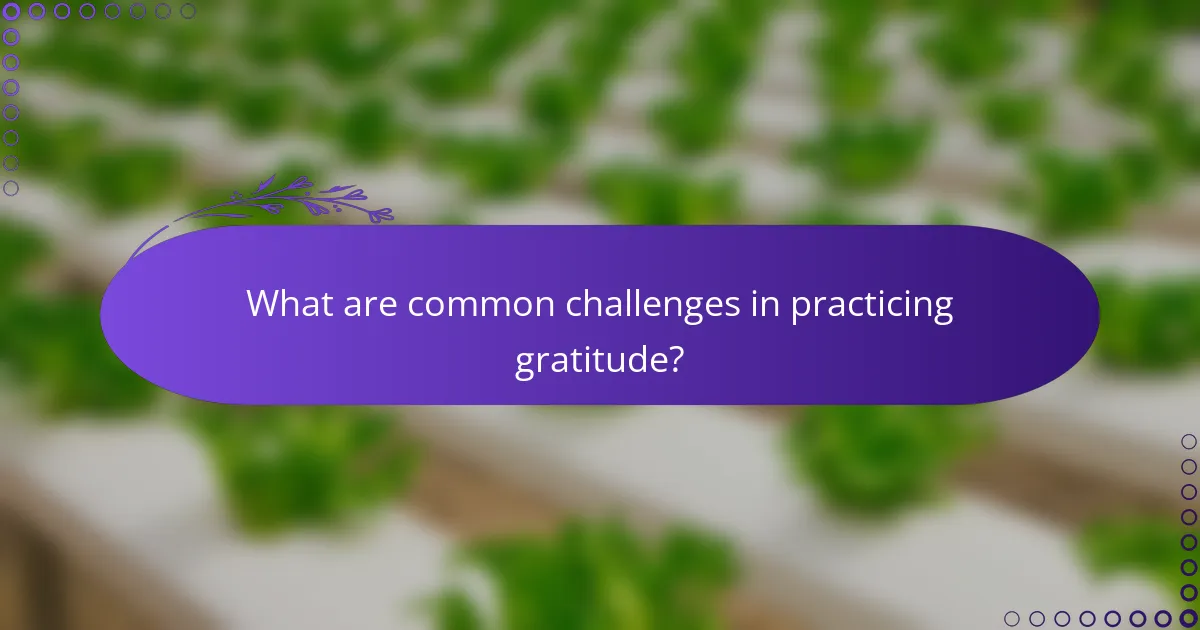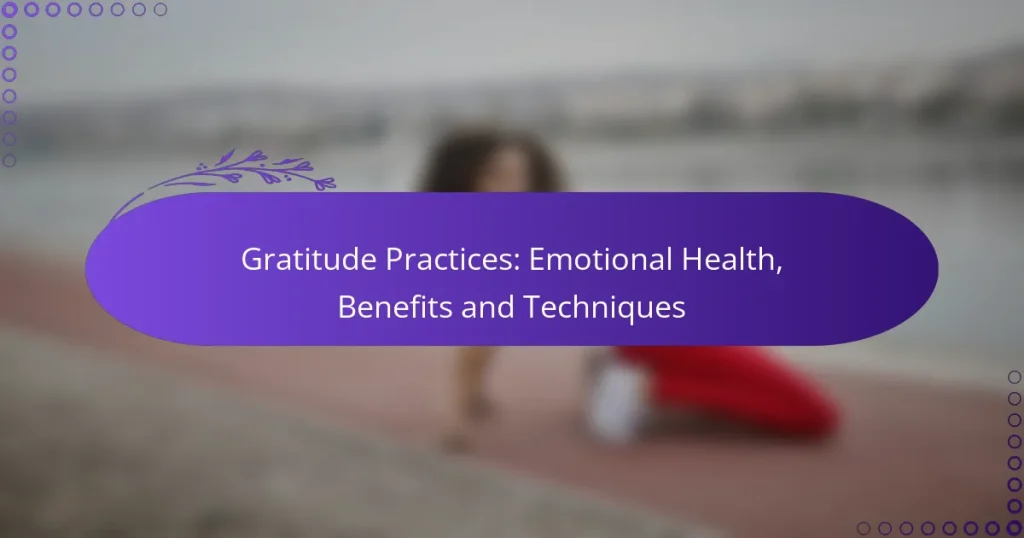Gratitude practices play a crucial role in enhancing emotional health by promoting a positive mindset and alleviating negative emotions. By regularly engaging in gratitude activities, individuals can shift their focus towards the positive aspects of life, leading to improved mood and overall mental well-being. Simple techniques can be easily integrated into daily routines, fostering appreciation and cultivating a more optimistic outlook.

How can gratitude practices improve emotional health?
Gratitude practices can significantly enhance emotional health by fostering a positive mindset and reducing negative feelings. Engaging in regular gratitude activities helps individuals focus on the positive aspects of their lives, which can lead to improved mood and overall mental well-being.
Reduces stress and anxiety
Practicing gratitude can lower stress and anxiety levels by shifting focus away from negative thoughts. When individuals regularly acknowledge what they are thankful for, they cultivate a more positive outlook that can diminish feelings of worry and tension.
Simple techniques, such as keeping a gratitude journal or sharing daily appreciations with friends, can effectively reduce stress. These practices encourage mindfulness and help individuals manage their emotional responses to challenging situations.
Enhances overall well-being
Gratitude practices contribute to enhanced overall well-being by promoting a sense of fulfillment and happiness. Research indicates that individuals who regularly express gratitude report higher levels of life satisfaction and emotional stability.
Incorporating gratitude into daily routines, such as reflecting on positive experiences before bed, can foster a more optimistic perspective. This shift can lead to improved physical health, as a positive mindset is often linked to better immune function and lower blood pressure.
Strengthens relationships
Expressing gratitude can strengthen relationships by fostering deeper connections and improving communication. When individuals show appreciation for others, it enhances feelings of trust and mutual respect, which are essential for healthy relationships.
Regularly thanking friends, family, or colleagues can create a supportive environment that encourages open dialogue. Simple gestures, like sending a thank-you note or verbally acknowledging someone’s efforts, can significantly enhance relational bonds.
Boosts resilience
Gratitude practices can boost resilience by helping individuals cope with adversity more effectively. A grateful mindset enables people to view challenges as opportunities for growth rather than insurmountable obstacles.
To build resilience through gratitude, individuals can focus on lessons learned from difficult experiences and express appreciation for the support they receive during tough times. This practice not only strengthens emotional fortitude but also encourages a proactive approach to future challenges.

What are effective gratitude techniques?
Effective gratitude techniques are practices that help individuals cultivate a sense of appreciation and thankfulness in their daily lives. These methods can enhance emotional health by fostering positive thinking and improving overall well-being.
Gratitude journaling
Gratitude journaling involves regularly writing down things you are thankful for, which can shift your focus from negative to positive experiences. Aim to write in your journal a few times a week, noting at least three things you appreciate each time.
To make it more effective, consider being specific about why you are grateful for each item. For example, instead of writing “I am thankful for my friend,” you might say, “I am grateful for my friend Sarah because she always knows how to make me laugh.” This specificity can deepen your emotional connection to your gratitude practice.
Gratitude letters
Writing gratitude letters is a powerful way to express appreciation to someone who has positively impacted your life. In these letters, articulate how their actions or presence have made a difference to you.
Consider delivering the letter in person if possible, as this can enhance the emotional impact for both you and the recipient. If in-person delivery isn’t feasible, sending it via email or traditional mail can still convey your heartfelt thanks.
Mindfulness meditation
Mindfulness meditation can incorporate gratitude by focusing on the positive aspects of your life during your practice. Spend a few minutes each session reflecting on what you are grateful for, whether it’s people, experiences, or simple pleasures.
To enhance this practice, visualize each item you are thankful for and allow yourself to fully experience the emotions associated with that gratitude. This can help reinforce positive feelings and improve emotional resilience over time.
Daily gratitude reflections
Daily gratitude reflections involve taking a few moments each day to consciously think about what you appreciate. This can be done at any time, such as during your morning routine or before bed.
To make this practice more structured, consider setting a timer for five minutes and listing out your thoughts either mentally or on paper. This consistent reflection can help solidify a habit of gratitude and improve your overall outlook on life.

How to implement gratitude practices in daily life?
Implementing gratitude practices in daily life involves intentional actions that foster appreciation for positive experiences. By integrating simple techniques into your routine, you can enhance emotional well-being and cultivate a more positive mindset.
Set reminders for gratitude moments
Setting reminders can help you pause and reflect on what you are grateful for throughout the day. Consider using your phone or sticky notes in visible places to prompt these moments. Aim for a few times daily, such as during meals or breaks, to create a consistent habit.
For example, you might set a morning reminder to list three things you appreciate from the previous day. This practice can shift your focus and improve your mood as you start your day.
Incorporate gratitude into family routines
Incorporating gratitude into family routines strengthens bonds and encourages a positive atmosphere at home. Designate a time, such as during dinner, for each family member to share something they are thankful for that day.
This practice not only fosters appreciation but also enhances communication. You can also create a gratitude jar where family members can write down their thankful moments and read them together at the end of the month.
Use gratitude apps like Happify
Gratitude apps like Happify can provide structured activities and reminders to help you practice appreciation regularly. These apps often include exercises, journaling prompts, and games designed to boost your mood and reinforce positive thinking.
Many of these apps offer free versions with basic features, making them accessible for anyone looking to enhance their gratitude practice. Explore different options to find one that fits your lifestyle and preferences, ensuring it supports your emotional health effectively.

What are the long-term benefits of gratitude practices?
Gratitude practices can lead to significant long-term benefits for emotional and physical well-being. Regularly expressing gratitude fosters a positive mindset, enhances relationships, and contributes to overall life satisfaction.
Improved mental health
Engaging in gratitude practices can significantly improve mental health by reducing symptoms of depression and anxiety. Studies suggest that individuals who regularly express gratitude experience lower levels of negative emotions and higher levels of positive feelings.
To incorporate gratitude into daily life, consider keeping a gratitude journal where you write down a few things you are thankful for each day. This simple act can shift your focus from stressors to positive aspects of life.
Increased life satisfaction
Practicing gratitude is closely linked to increased life satisfaction. Individuals who regularly acknowledge what they are thankful for often report feeling more fulfilled and content with their lives.
To enhance life satisfaction, try expressing gratitude to others, whether through verbal acknowledgment or written notes. This not only boosts your mood but also strengthens social bonds, creating a positive feedback loop.
Better physical health
Gratitude practices can lead to better physical health by promoting healthier lifestyle choices. Grateful individuals are more likely to engage in regular exercise, maintain a balanced diet, and get adequate sleep.
To reap these benefits, set aside time each week to reflect on what you appreciate in your life. This reflection can motivate you to take better care of your body, leading to improved overall health and well-being.

What are common challenges in practicing gratitude?
Practicing gratitude can be hindered by various challenges that affect emotional health and well-being. Common obstacles include maintaining consistency in gratitude practices and overcoming entrenched negative thought patterns.
Difficulty in maintaining consistency
One of the primary challenges in practicing gratitude is the difficulty in maintaining consistency. Many individuals start with enthusiasm but struggle to incorporate gratitude into their daily routines. Setting specific times, such as morning or evening, can help establish a habit.
To improve consistency, consider using reminders or journaling prompts. Keeping a gratitude journal where you write down three things you are thankful for each day can reinforce the practice. Aim for a frequency that feels manageable, such as a few times a week, rather than daily if that feels overwhelming.
Overcoming negative thought patterns
Negative thought patterns can significantly impede gratitude practices. When individuals are caught in cycles of negativity, it can be challenging to recognize and appreciate positive aspects of life. Acknowledging these thoughts without judgment is the first step toward overcoming them.
To combat negativity, try reframing thoughts by focusing on what you can learn from difficult situations. Techniques such as mindfulness and cognitive restructuring can help shift focus from negative to positive. Additionally, surrounding yourself with supportive people who encourage gratitude can foster a more positive mindset.


